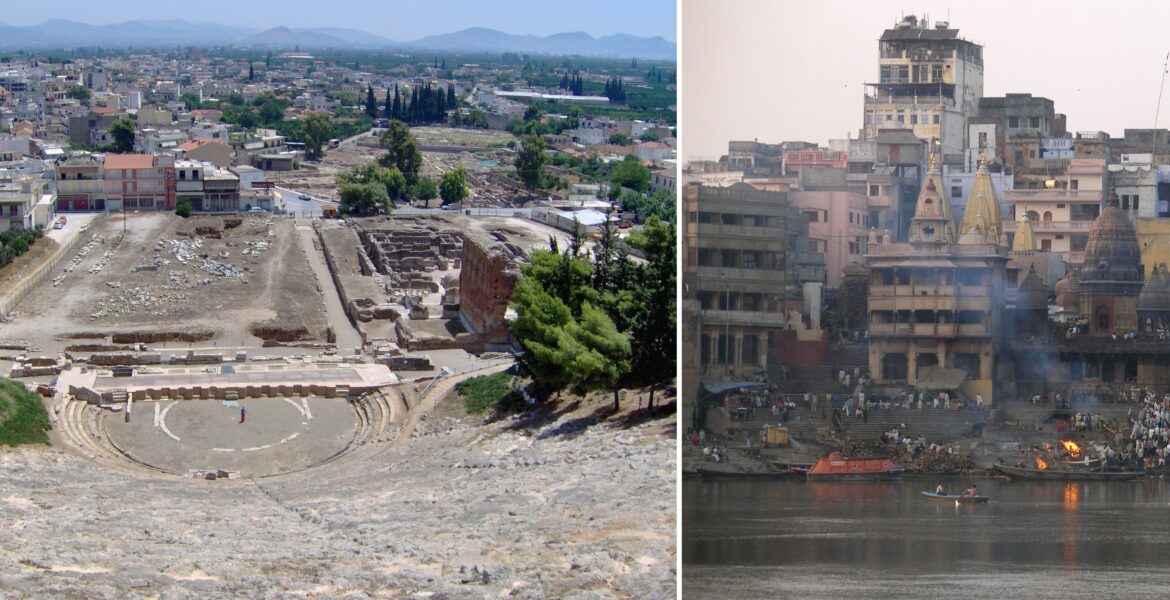From Argos in the Peloponnese to Varanasi in India, here are 10 of the oldest cities in the world.
Damascus, Syria (11,000 years)
The oldest city in the world, Damascus is also known as the capital of Arab culture. It has witnessed the rise and fall of many great civilizations, including the Ancient Greek and Eastern Romans.
According to scientific findings and historical data, Damascus was originally inhabited in the second half of the 7th millennium B.C. It is also the oldest continuously inhabited city worldwide and a significant Arab cultural hub.
Aleppo, Syria (8,000 years)
Aleppo has been inhabited continuously for over 8,000 years. It is a fact that there, remains of human settlements from 11,000 B.C. have been discovered. Aleppo was a significant commerce centre in the ancient world because of its strategic location between Mesopotamia and the Mediterranean Sea.
However, Aleppo has been experiencing destruction since 2012 as a result of conflict between the government and opposition forces, which has resulted in thousands of deaths and driven many people from their homes, including the Greek Orthodox community.
Argos, Greece (7,000 years)
One of the world's oldest cities that has been inhabited continuously is Argos. Research indicates that Argos maintained its neutrality for much of Ancient Greece's history and refrained from taking sides in the Greco-Persian Wars. There are still several antique monuments in Argos.
Athens, Greece (7,000 years)
With its earliest human presence dating back to about the eleventh and the seventh millennia BC, Athens dominated the Attica region. This city is also the origin of Western civilizations and an old centre for philosophy.
In fact, it boasts of long-preceding Socrates, Plato, and Aristotle periods of human existence. The Dorian and Persian invasions completely destroyed the city after it withstood the test of time.
Byblos, Lebanon (7,000 years)
Humans are thought to have initially settled at Byblos between 8800 and 7000 B.C., and have remained there constantly since 5000 BC. This city, also a UNESCO World Heritage Site, is thought to have been the location of Greece's initial papyrus import.
Because of the numerous layers of remains left behind by millennia of human existence, this city is also a wonder of archaeology.
Susa, Iran (6,300 years)
Susa, a Proto-Elamite city from antiquity, was one of the most significant cities in the Ancient Near East since it served as the centre of several early civilizations that flourished in what is now roughly the Middle East.
The Assyrians are thought to have entirely destroyed the city in the past, but it was rapidly rebuilt and saw its heyday during the Persian Empire.
Erbil, Iraq (6,000 years)
Over the centuries, the Persians, Greeks, Romans, Mongols, and Ottoman Turks have all left their mark in Erbil.
The Erbil Citadel, also known as Hawler Castle, is a historic building that goes back to 2,000 B.C. it is located in the middle of the city. The historical heart of Erbil is the artificial mound known as the Citadel.
Sidon, Lebanon (6,000 years)
Sidon was one of the most significant Phoenician cities due to its location as a vital port on the Mediterranean, where it had been inhabited for at least the last 6,000 years. Sidon became well-known and wealthy thanks to the manufacturing of glass, and it gained a reputation for being innovative.
The Phoenicians were renowned for their expertise in shipbuilding and Mediterranean Sea navigation.
Plovdiv, Bulgaria (6,000 years)
Plovdiv is one of the oldest cities in Europe, with a history spanning more than six millennia. According to excavations, the ancient village on the Nebet Tepe Hill has been inhabited since 4000 B.C.
The town served as a key centre for the Persian, Thracian, Macedonian, and Ottoman empires. Plovdiv, the second-largest city in Bulgaria today, is also a developing tourist destination.
Varanasi, India (5,000 years)
Hinduism, the oldest religion in existence, was founded in Varanasi, the oldest city in India. This city, which also goes by the names Banaras or Kashi, is in the most populous state in the nation, Uttar Pradesh, and it was founded in the eleventh century B.C.
Hindu pilgrims and tourists from all over the world come to this city to take a dip in the Ganges and participate in funeral ceremonies. Along the narrow lanes of Varanasi, there are about 2,000 temples.
Compiled by Times Now News.
READ MORE: Marriage Rules in Minoan Crete Revealed by Ancient DNA Analysis.


